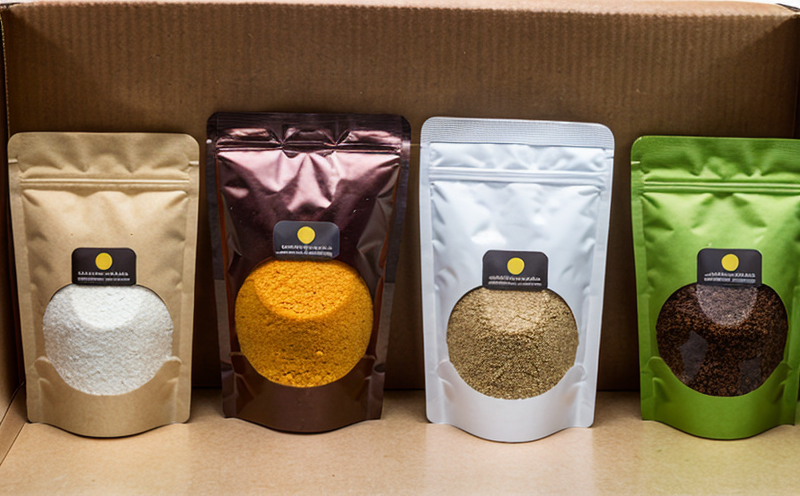Post-Market Surveillance Testing of Food Packaging
The post-market surveillance testing of food packaging is a crucial part of ensuring consumer safety and regulatory compliance. This process involves evaluating food contact materials (FCMs) after they have been introduced into the market to identify any potential risks or issues that may arise during use.
Post-market surveillance tests are conducted on FCMs to evaluate their performance under real-world conditions, which can differ significantly from laboratory testing environments. These tests assess various factors including chemical migration, physical integrity, and microbial safety. Regulatory authorities worldwide, such as the Food and Drug Administration (FDA) in the United States and the European Union's legislation, mandate these evaluations.
The objective of post-market surveillance is to safeguard public health by detecting any adverse effects that may not have been apparent during pre-market testing. This includes checking for leachable substances like plasticizers or other additives that could migrate into food products, leading to contamination or health hazards.
For effective post-market surveillance, it's essential to select a reputable laboratory with expertise in this area. Our team uses advanced analytical techniques and state-of-the-art equipment tailored specifically for FCM analysis. We employ rigorous testing protocols based on international standards such as ISO 10397:2014 "Plastics — Determination of the migration of substances from articles intended to come into contact with foodstuffs".
Our services encompass a wide range of tests designed to address specific concerns related to FCMs. These include but are not limited to assessing the leaching of heavy metals, evaluating barrier properties against oxygen and water vapor permeability, determining allergen transfer rates, and verifying biodegradability for environmentally friendly packaging solutions.
The results from our comprehensive post-market surveillance testing provide valuable insights into the safety profile of food contact materials. These findings enable manufacturers to make informed decisions about corrective actions if necessary while also enhancing consumer confidence in their product offerings.
Industry Applications
| Application Area | Description |
|---|---|
| Plastic Bottles & Containers | Testing for potential leachates that might affect food quality. |
| Paperboard and Cardboard Boxes | Evaluating the integrity of packaging materials to prevent contamination during transport. |
| Metal Cans & Aerosol Containers | Assessing compatibility with different types of foods to ensure safe storage conditions. |
| Bakery Products Packaging | Checking for any adverse reactions between packaging materials and baked goods during shelf life. |
| Reusable Containers | Monitoring the stability of materials used in repeated cycles, particularly concerning hygiene issues. |
- Plastic Bottles & Containers: These are frequently used for beverages and other liquid products. Testing focuses on ensuring no harmful chemicals leach into the drink over time.
- Paperboard and Cardboard Boxes: Commonly employed in food packaging, especially for dry goods like cereal boxes or pasta packages. We check for moisture resistance to maintain product freshness.
Environmental and Sustainability Contributions
The post-market surveillance of food packaging plays a vital role in promoting sustainable practices within the industry. By identifying potential environmental impacts associated with specific FCMs, companies can work towards reducing their carbon footprint through more eco-friendly alternatives.
Our laboratory supports sustainability efforts by providing data on biodegradability and recyclability rates for various packaging types. This information helps manufacturers adopt greener manufacturing processes that align with global environmental goals outlined in frameworks like the Paris Agreement.
Moreover, we assist clients in complying with increasingly stringent regulations concerning sustainable materials. For instance, many regions now require specific percentages of recycled content or bioplastics in certain product categories. Our testing ensures compliance while offering innovative solutions for improved resource efficiency.
Competitive Advantage and Market Impact
- Enhanced Consumer Trust: Demonstrating commitment to safety through rigorous post-market surveillance builds brand loyalty among consumers who value trustworthiness above all else.
- Regulatory Compliance: Staying ahead of changing regulations ensures long-term viability and helps avoid costly legal penalties or market withdrawals.
- Innovation Leadership: Early detection of emerging threats allows companies to innovate proactively, staying one step ahead of competitors in the marketplace.
- Risk Mitigation: Identifying potential risks early enables businesses to implement corrective measures promptly, minimizing disruptions and maintaining operational continuity.
By investing in post-market surveillance testing, firms can protect their reputation, enhance customer satisfaction, and maintain competitive edge. Our detailed reports not only meet regulatory requirements but also provide actionable insights that drive strategic decision-making processes within organizations.





